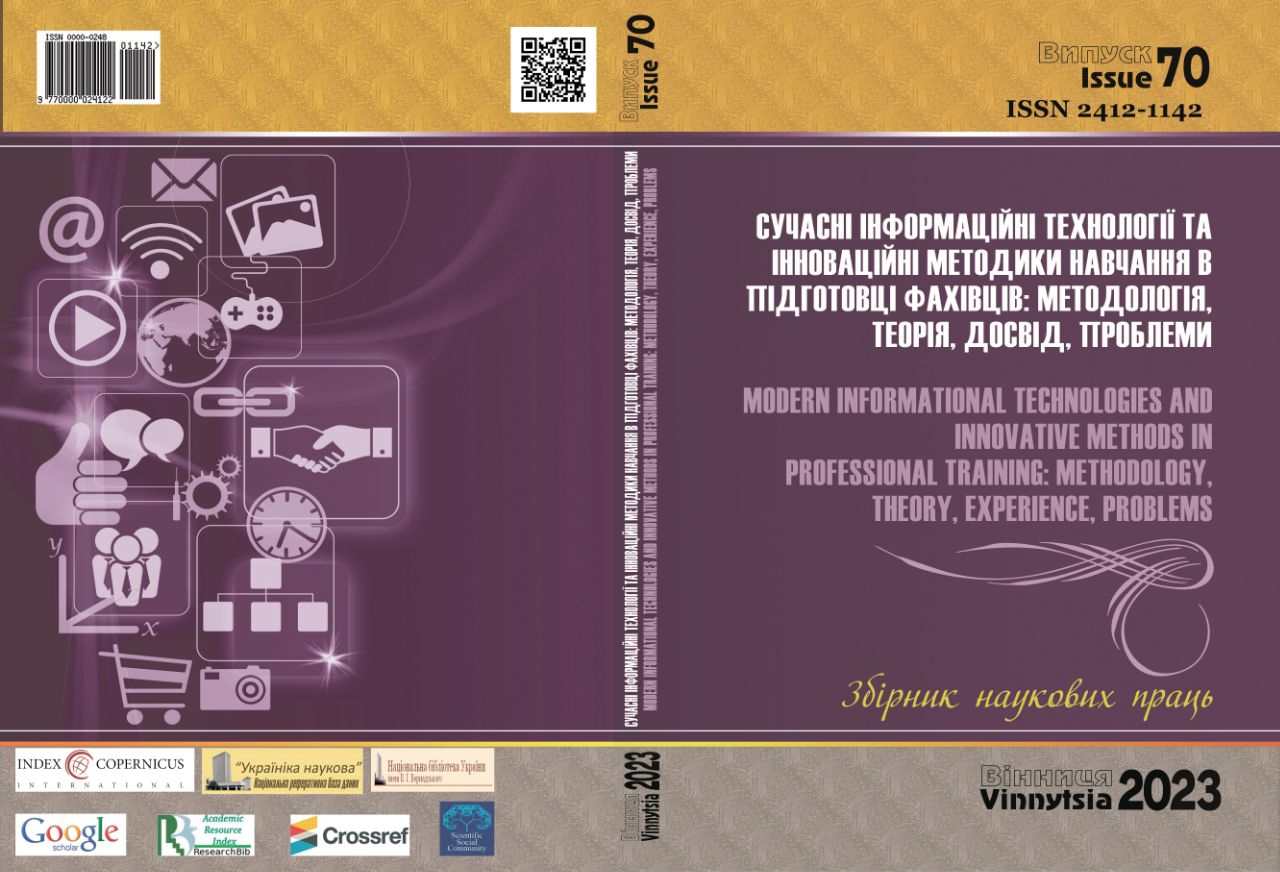THEORETICAL PRINCIPLES OF FORMATION OF PROFESSIONAL TOLERANCE OF FUTURE TEACHERS OF PRIMARY GRADES UNDER THE CONDITIONS OF MARITAL STATE
DOI:
https://doi.org/10.31652/2412-1142-2023-70-99-106Keywords:
pedagogical tolerance, future primary school teachers, younger schoolchildren, intercultural content of education, communicative and cultural intolerance, ways of formationAbstract
The article raises the problem and emphasizes the relevance of the formation of individual tolerance in modern conditions. In particular, the aim of the article is to study the theoretical foundations of the formation of pedagogical tolerance of future elementary school teachers in the conditions of martial law, which is achieved by applying a set of appropriate methods (analysis of philosophical, pedagogical and psychological literature; study and generalization of pedagogical experience, etc.). The presented research specifies and substantiates the essence the concept of «tolerance» - a means of achieving educational and educational tasks; one of the leading goals of the education process and «professional tolerance» is an integrated characteristic, a professionally important quality. The main signs of tolerant thinking are defined: the ability to take a person's point of view - decentration as opposed to infantile egocentrism; the ability to identify essential and minor features in the object being evaluated; the ability to ambivalence in the perception of an object, in which a person can see both positive and negative characteristics at the same time, as opposed to black and white univalent perception; the ability to establish similarities and differences between the same objects on different grounds, forming different groups; flexibility of thinking, which consists in the readiness to change one's ideas about the object in connection with the received new information. The essence, structure and functions of pedagogical tolerance of future primary school teachers are considered. The main ways of its formation during the education of students in a higher education institution are outlined. The importance of the teacher's guidance on the formation of a tolerant attitude towards others in younger schoolchildren is emphasized. The main ways of developing the professional tolerance of future teachers in higher education are outlined: the systematic formation of a stable position in students regarding strict compliance with the requirements of pedagogical ethics, the understanding of the unconditional value of each child, regardlessof his nationality, faith and level of development; organization of tolerant interaction during classes, group and collective educational and extracurricular activities of students; intercultural content of pedagogical education, in particular academic disciplines related to art; directing students to the formation of tolerance skills in children.
Downloads
References
Dubinka M. (2007) Psykholoho-pedahohichni umovy zabezpechennia efektyvnosti mizhosobystisnoho spilkuvannia Psychological and pedagogical conditions for ensuring the effectiveness of interpersonal communication.. Ridna shkola. № 4 (927). S. 33–36. in Ukrainian.
Kilova H. (2020) Formy i vydy adaptatsii pedahohichnykh pratsivnykiv v zahalnoosvitnomu navchalnomu zakladi. Forms and types of adaptation of teachers in secondary school. URL: http://umo.edu.ua/images/content/nashi_vydanya/metod_upr_osvit/v_9/20.pdf in Ukrainian.
Matiikiv I. M. (2008) Psykholohichni faktory vplyvu na formuvannia profesiinoi kompetentnosti fakhivtsiv sfery obsluhovuvannia: rezultaty eksperymentu.Psychological factors influencing the formation of professional competence of service professionals: the results of the experiment. Pedahohika i psykholohiia profesiinoi osvity. № 4. S. 209–216. in Ukrainian.
Prykhodko Yu. O. (2009) Profesiine samovyznachennia yak chynnyk osobystisnoho rozvytku Professional selfdetermination as a factor of personal development.. Nastupnist u diialnosti zahalnoosvitnoi ta profesiinoi shkoly v profilnomu navchanni: materialy V Mizhnar. nauk.-prakt. konferentsii / Instytut pisliadyplomnoi osvity inzhenerno-pedahohichnykh pratsivnykiv Universytetu menedzhmentu osvity. – Donetsk: IPO IPP UMO. S. 36–37. in Ukrainian.
Rudenko L. A. (2012) Suchasni teoretychni pidkhody do kultury spilkuvannia u profesiinii sferi Modern theoretical approaches to the culture of communication in the professional sphere... Pedahohika i psykholohiia profesiinoi osvity № 1 S. 9–15. in Ukrainian.
Simko R. T. (2011) Poniattia hotovnosti do profesiinoi diialnosti na suchasnomu etapi rozvytku psykholohichnoi nauky The concept of readiness for professional activity at the present stage of development of psychological science. .Problemy suchasnoi psykholohii: zb. nauk. prats K-PNU imeni Ivana Ohiienka, Instytutu psykholohii im. H. S. Kostiuka NAPN Ukrainy. – K.: Instytut psykholohii im. H. S. Kostiuka NAPN Ukrainy, Vypusk 13. S. 415–425. in Ukrainian.
Averill J.R., Thomas-Knowlеs C. (1991) Emotional Creativity. Strongman K.T. (ed.) International review of studies on emotion. London: Wiley, V.1. P. 269–299.
Bar-On R. (2000) Emotional and social intelligence: Insights from the Emotional Quotient Inventory. Handbook of emotional intelligence. San Francisco: Jossey-Bass, P. 363–388.
Buck R. (1991) Motivation emotion and cognition: A developmental-interactionist view. International review of studies on emotion. – Chichester: Wiley, V.1. Р. 101–142.
Goleman D. (2001) An EI-based theory of performance .The emotionally intelligent workplace. – San Francisco: Jossey-Bass, 2001. P. 27–44.
Downloads
Published
Issue
Section
License
Copyright (c) 2023 Бикова Марія Миколаївна, Лобова Ольга Володимирівна, Проценко Ірина Іванівна

This work is licensed under a Creative Commons Attribution 4.0 International License.

